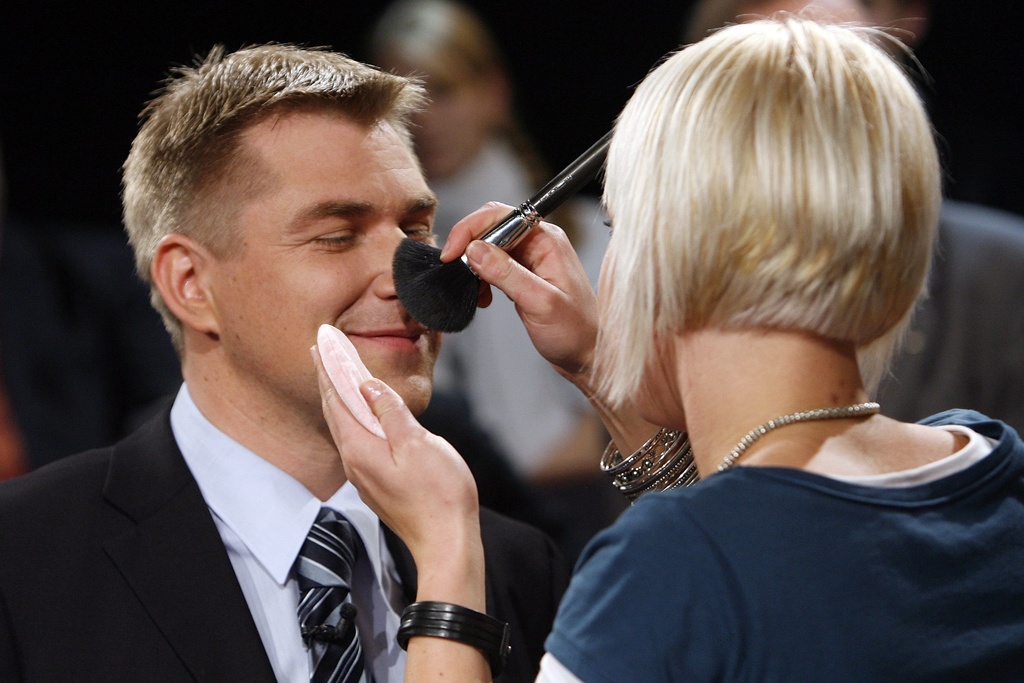How far do good looks go in Swiss politics?

The physical attractiveness of a politician matters more than we might be willing to admit, but how decisive is beauty in Switzerland’s direct democracy?
Political scientist Georg Lutz tells swissinfo.ch why Miss and Mister Switzerland have a relative advantage but they would not win a seat in a parliamentary election.
Lutz, an expert in political behaviour, carried out an experimental study at the Centre of Expertise in the Social Sciences at Lausanne University with data from the previous parliamentary elections.
It has often been shown that few voters base their choice on complex political considerations, including party programmes or performance of incumbent parties and candidates, as they are not necessarily interested in politics.
But Lutz says one of the aims of his survey was to try to shed more light on voting behaviour and hopefully make people think about the mechanisms in an electoral campaign.
swissinfo.ch: How important is it for a party to present physically attractive candidates?
Georg Lutz: For the competition between the parties it doesn’t really matter a great deal. A party is interested in winning as many seats as possible.
But each party needs some candidates that can present the party programme in a coherent way. And if they happen to be physically attractive, that’s probably an asset.
For an individual candidate it’s certainly quite helpful because the competition is not between candidates from different parties but among candidates from the same party.
swissinfo.ch: Would a Miss or Mister Switzerland be guaranteed a seat if a party could convince him or her to stand?
G.L.: Being good-looking helps – it can make a difference – but it is not enough. Candidates must be credible and have some political roots. They also have to be able to make basic policy statements. The competition for a seat in parliament is tough within all parties.
swissinfo.ch: Was your study able to establish whether attractiveness plays a bigger role for male or female candidates and voters?
G.L.: We could not distinguish whether the beauty factor matters more for female or male candidates. But we found evidence that it matters for both sexes. Attractive women and attractive men get more votes than those considered less attractive.
swissinfo.ch: How is attractiveness defined?
G.L.: In scientific literature there is the notion of ‘attractiveness consensus’.
There is agreement throughout the world, from Europe to Asia and the United States, about which faces look attractive and which don’t.
Of course there are differences between individuals about what they consider good-looking or not, but interestingly the variant is very limited. If one candidate is found to be attractive by a person from one country, the same candidate is likely to be perceived as attractive by a person from a completely different background.
swissinfo.ch: What factors – position on the ballot sheet, incumbency, popularity, beauty – are most important for electoral success?
G.L.: In general terms, being known increases your chances of getting elected for the simple reason that there are very many candidates in a federal parliamentary election. But most of the candidates do not get much public attention and many do not run much of a campaign either.
Those who are successful have managed to be noticed by a sufficient number of voters. That is even more important than having a coherent policy programme.
swissinfo.ch: How surprising are your findings about the advantage of attractiveness?
G.L.: The fact that the perceived attractiveness has a – reasonably strong – impact on the number of votes did not come as a surprise. It is in line with previous studies which found that attractiveness matters in very different contexts.
But the goal of the study was not so much to surprise people but to cast a critical eye on voting behaviour.
An ideal democratic model assumes that voters study party manifestos, examine the candidates – their background, their experience – and only then make an informed and rational decision.
In actual fact there are very simple factors such as attractiveness or position on the ballot sheet which influence a voter’s choice. These are not very rational criteria and they show how quickly choices about candidates are made.
swissinfo.ch: Isn’t that worrying?
G.L.: Well, good looks are not decisive. But it shows that choosing a candidate is no different from picking a product from a shelf – a decision based for instance on the colour of the box the product is sold in.
But there’s no cause for alarm because such superficial criteria do not apply to the same extent to the choice of a specific political party.
Most voters do not compare candidates from all the different parties but only from within the one party they feel close to. Ultimately the number of seats is more important than the individual candidate who represents the party in parliament.
swissinfo.ch: What kind of reaction did your study get in the academic world and the media?
G.L.: The media liked it. It’s typically one of those things they love – and doesn’t this interview prove it? (Laughs.)
The other reaction was mixed. There were those scientists from the field of political psychology who appreciated the study, its experimental set-up and methods. Then there were those who carped about the simple and obvious result. For them the study was pointless.
Then there were the critics who said it was shocking to carry out such a study that comes to such a conclusion. They said it’s not very flattering for democracy as it debunks the notion that citizens decide purely on rational criteria.
My post at Lausanne University is funded by the National Science Foundation and I enjoy the academic freedom to carry out such studies. I’m therefore not that bothered by such criticism.
The research evaluated 744 candidates out of a total of 3,089 people who stood in the 2007 elections to the House of Representatives.
Respondents were asked to assess the physical attractiveness of the candidates and their competence.
Their choices were compared with the actual result in the 2007 elections.
The pictures in the survey were randomised and the participants were allowed to take breaks during the online evaluation which took more than two hours each.
The result of the study was published in the Swiss Political Science Review, vol. 16, issue 3, from October 2010.
Elections to the Swiss parliament take place every four years – the next ones are scheduled for October 23, 2011.
Under the Swiss open ballot electoral system – based mainly on proportional representation – voters choose between parties or candidates, but also between candidates from within a party.
The Swiss parliament is made up of the 200-strong House of Representatives and the 46-seat Senate.
Twelve political parties currently have seats in parliament – five of them are represented in the cabinet.

In compliance with the JTI standards
More: SWI swissinfo.ch certified by the Journalism Trust Initiative













You can find an overview of ongoing debates with our journalists here . Please join us!
If you want to start a conversation about a topic raised in this article or want to report factual errors, email us at english@swissinfo.ch.